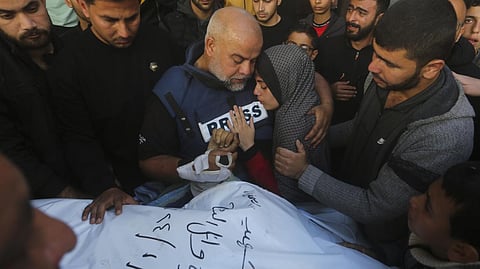

India ranks 159th in the 2024 world Press Freedom Index published annually by Reporters Without Borders (RSF). Pakistan is ranked 152 while Sri Lanka 150.
India's ranking was 161 out of 180 countries last year.
The index ranks 180 countries on the ability of journalists to work and report freely and independently.
In the Asia-Pacific region – the world’s second most difficult region for practising journalism – five countries are among the world’s ten most dangerous countries for media personnel: Myanmar (171st), China (172nd), North Korea (177th), Vietnam (174th) and Afghanistan (178th). But, unlike last year, none of the region’s countries is in the Index’s top 15.
In the Middle East and North Africa, the situation is “very serious” in nearly half of the countries. The United Arab Emirates joins the eight other countries in the red zone on the map: Yemen, Saudi Arabia, Iran, Palestine, Iraq, Bahrain, Syria and Egypt. Palestine, occupied and under bombardment by the Israeli army, and the deadliest country for journalists, is also at the bottom of the Index. Qatar is now the region’s only country where the situation is not classified either as “difficult” or “very serious.”
The countries where press freedom is “good” are all in Europe, and more specifically within the European Union, which has adopted its first media freedom law (EMFA). Ireland has dropped out of the Index’s top three countries, replaced by Sweden, while Germany is now one of the top ten countries. Press freedom is nonetheless being put to the test in Hungary, Malta and Greece, the three lowest-ranked EU countries.
The overall decline in the political indicator has also affected the trio at the top of the World Press Freedom Index. Norway, still in first place, has seen a fall in its political score, and Ireland (8th), where politicians have subjected media outlets to judicial intimidation, has ceded its leading position in the European Union to Denmark (2nd), followed by Sweden (3rd).
As more than half the world's population goes to the polls in 2024, RSF is warning of a worrying trend revealed by the 2024 World Press Freedom Index: a decline in the political indicator, one of five indicators detailed in the Index. States and other political forces are playing a decreasing role in protecting press freedom. This disempowerment sometimes goes hand in hand with more hostile actions that undermine the role of journalists, or even instrumentalise the media through campaigns of harassment or disinformation. Journalism worthy of that name is, on the contrary, said Anne Bocandé, RSF editorial director.
The RSF, according to The Guardian, also painted a bleak picture of the increasing use of artificial intelligence, calling its use in the arsenal of disinformation for political purposes “disturbing”, with deepfakes being used to influence the course of elections.
Reporting on the war against nature is also proving increasingly dangerous. Forty-four journalists have been killed for covering environment stories over the past 15 years, according to a separate report by Unesco, which organises today’s World Press Freedom Day.